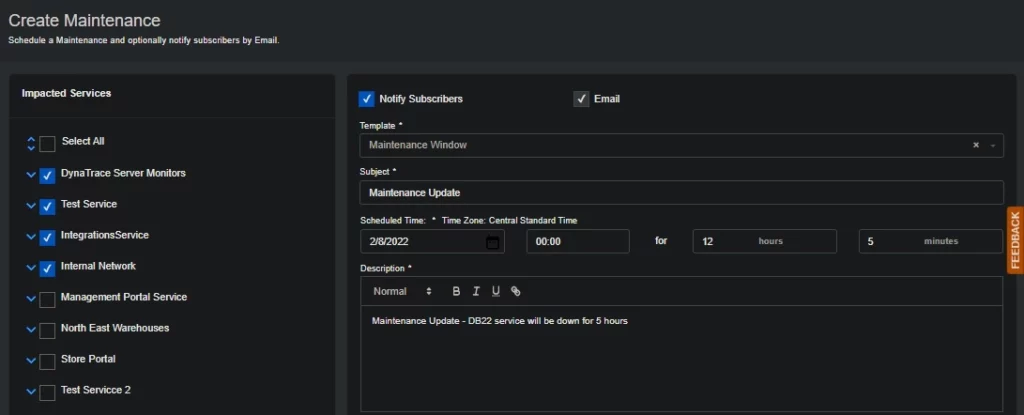Service Status Maintenance Windows

With this update to Service Status, create Maintenance Windows and select which services you’d like to place under Maintenance. This will prevent any Incidents from being created during the period of the maintenance window. Leverage the Notification features to notify subscribers an hour before maintenance begins, when maintenance begins, along with when maintenance ends.
DevOps Automation: A “Powerhouse” Tool

Powerful Culture The DevOps model unites development and IT operations to create a powerful organizational culture to achieve business goals more efficiently. Formerly siloed teams can now collaborate continuously to build more robust products, with increased confidence, and achieve business goals faster. No Pain, No Gain DevOps may be a game-changer but it can be […]
9 Barriers to DevOps Implementation

Transformative Goals The DevOps model unites development and IT operations to create a powerful organizational culture to achieve business goals more efficiently. Formerly siloed teams can now collaborate continuously to build more robust products, with increased confidence, and achieve business goals faster. The model has the power to transform operations, but there are DevOps Barriers that […]
What is DevOps in 2023?

DevOps: To Break Down Organizational Silos What is DevOps? DevOps is a term for a cluster of concepts that has become a movement, “a cross-disciplinary practice dedicated to the study of building, evolving and operating, rapidly-changing resilient systems at scale.” (Jez Humble) The definition of DevOps is not agreed upon by everyone because of the complex processes […]
APM Monitoring (Application Performance Monitoring) 2025?

Application performance monitoring (APM) solutions can help your business enhance its IT and grow its operations. To understand why, let’s answer some of the key questions surrounding APM. What Is Application Performance Monitoring? APM involves the use of technologies and tools to maintain consistent application availability, performance, and response times. So, your business can use […]
AlertOps Expert Guidance

On-Demand Expert Support At AlertOps, we believe our job doesn’t end when you complete the procurement of our software service. It has just begun, our support team is only a call, email or chat away, to guide you toward your goal. Our Customer Success team will also be in constant touch, helping you with your […]
AlertOps Automation

End-to-End Automation AlertOps is built for today’s fast paced enterprise. Managing an incident can many times be a chaotic time, so a streamlined workflow, that automatically routes to the next step in your business process, helps resolve the issue at hand quickly. End to end automated workflows, aided by rules engine, allow you to optimize […]
What is IT Monitoring? (2025)

IT monitoring involves the use of a combination of technologies to simultaneously ensure IT equipment performs as expected and resolve any identified IT problems. The capabilities of IT monitoring technologies vary; some technologies can perform a basic assessment of equipment across an IT environment, while others can automate the identification and remediation of equipment issues. Your […]
AlertOps Flexibility

Total Flexibility, No compromise We believe that our customers should not have to make compromises in their business process to implement and use AlertOps. AlertOps offers total flexibility, meaning it is highly configurable, legitimately addressing your pain points. One of our core tenets, that we use from our ideation stage of our product roadmap, thinking […]
How to Improve Your Building Management System

A building management system (BMS) lets your business monitor and control mechanical and electrical equipment across one or more buildings. Heating, cooling, and ventilation (HVAC), security, and other systems linked to a BMS usually represent 70% of a building’s energy usage. So, proper configuration of your BMS is key — otherwise, a poorly configured system […]